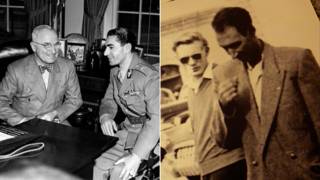
Related
Topics
New York Police Department Deputy Commissioner for Public Information, Paul Browne, described the ties between the NYPD and the the CIA as “an excellent relationship” on today’s edition of Democracy Now! [includes rush transcript]
In light of the NYPD’s recent surveillance activity, Democracy Now! asked Deputy Commissioner Paul Browne about the connections between the New York Police Department and the CIA.
In January 2002, David Cohen was appointed to be the NYPD’s first Deputy Commissioner of Intelligence. Cohen came to New York after a 35-year career with the CIA. From 1995 to 1997, Cohen served as the CIA’s Directorate of Operations, where he oversaw the agency’s worldwide operations, managed the CIA’s global network of offices and personnel, and maintained agency relationships with foreign intelligence and security services.
At the time of his appointment Police Commissioner Raymond Kelly said “David has a strong reputation for forging ties and working effectively with other government agencies, foreign governments, and the private sector, and his drawing upon those strengths and contacts will greatly benefit the City as he directs the Police Department’s intelligence efforts.”
- Paul J. Browne, New York City Police Department’s Deputy Commissioner of Public Information
Transcript
AMY GOODMAN: Let me just ask you, before we get to the end of the program, I wanted to ask you about the relationship between the New York Police Department, F.B.I, and C.I.A. In January 2002, David Cohen was appointed to be the NYPD’s first Deputy Commissioner of Intelligence. He came to New York after a 35-year career with the C.I.A. From 1995 to 1997, Cohen served as the Directorate of Operations, where he oversaw the agency’s worldwide operations, managed the C.I.A.'s global network of offices and personnel and maintained agency relationships with foreign intelligence and security services. At the time of his appointment, Police Commissioner Raymond Kelly said of David Cohen, quote, “David has a strong reputation for forging ties and working effectively with other government agencies, foreign governments and the private sector, and his drawing upon those strengths and contacts will greatly benefit the city as he directs the Police Department's intelligence efforts.” Your response, Commissioner Browne?
PAUL J. BROWNE: Well, what’s the question?
AMY GOODMAN: The relationship between the New York Police Department and the C.I.A., where David Cohen comes from and now heads intelligence for the New York Police Department?
PAUL J. BROWNE: Well, it’s an excellent relationship, one that I don’t think — we certainly had some relationship, but not to the extent now, where I think part of the reason we’re so successful in placing officers overseas in key capitals and inside some of their counterterrorism organizations is a result of the relationships that Commissioner Cohen has forged and had already established from his experience in the C.I.A. But we now have people in Tel Aviv, Amman, Jordan, the U.K., Interpol, and Toronto and Montreal, focusing on their counterterrorism activities and asking the New York question, essentially, 'Have you seen anything you're seeing, say, in Amman, Jordan, connected to New York, in terms of terrorism?’ And to be able to do that and do it relatively quickly, I think, is one example.
AMY GOODMAN: Norman Siegel, your response to C.I.A./police relationship?
NORMAN SIEGEL: I think that what New York is doing, and we’re finding out because of Jim and Eileen’s work, is very similar to what’s going on on the national level. And I think New Yorkers and Americans have to be asking the question, “How much power do we want to give to our law enforcement people post-9/11, taking into account that, with regard to spying and First Amendment activity? Recently on East 79th Street, a group of seniors were involved in a housing demonstration and TARU showed up and started videoing these people — the police — and it was across the street from Mayor Bloomberg’s house. There was no illegal activity. There was an agreement with the Police Department. This is the beginning of very serious substantial questions about how much power we want to give to the NYPD with regard to First Amendment activity.
AMY GOODMAN: We have to leave it there. Norman Siegel, civil rights attorney; Paul Browne, Deputy Commissioner of New York Police Department; Jim Dwyer of the New York Times; and Eileen Clancy of I-Witness Video.












Media Options